Are Weighted Blankets Safe?

The good news is that, yes, weighted blankets are considered safe for most healthy adults. However, some individuals should not use weighted blankets, including seniors and small children. This article will discuss what a weighted blanket is, how safe they are, risk factors, and the benefits of using weighted blankets. Let’s get started.
- What Is a Weighted Blanket?
- Are Weighted Blankets Safe?
- What Are Potential Risk Factors of Weighted Blankets?
- Weighted Blanket Safety Tips
- Who Uses Weighted Blankets?
- What Are the Benefits of Weighted Blankets?
- The Layla Weighted Blanket
- Weighted Blanket Safety FAQs
- Final Notes
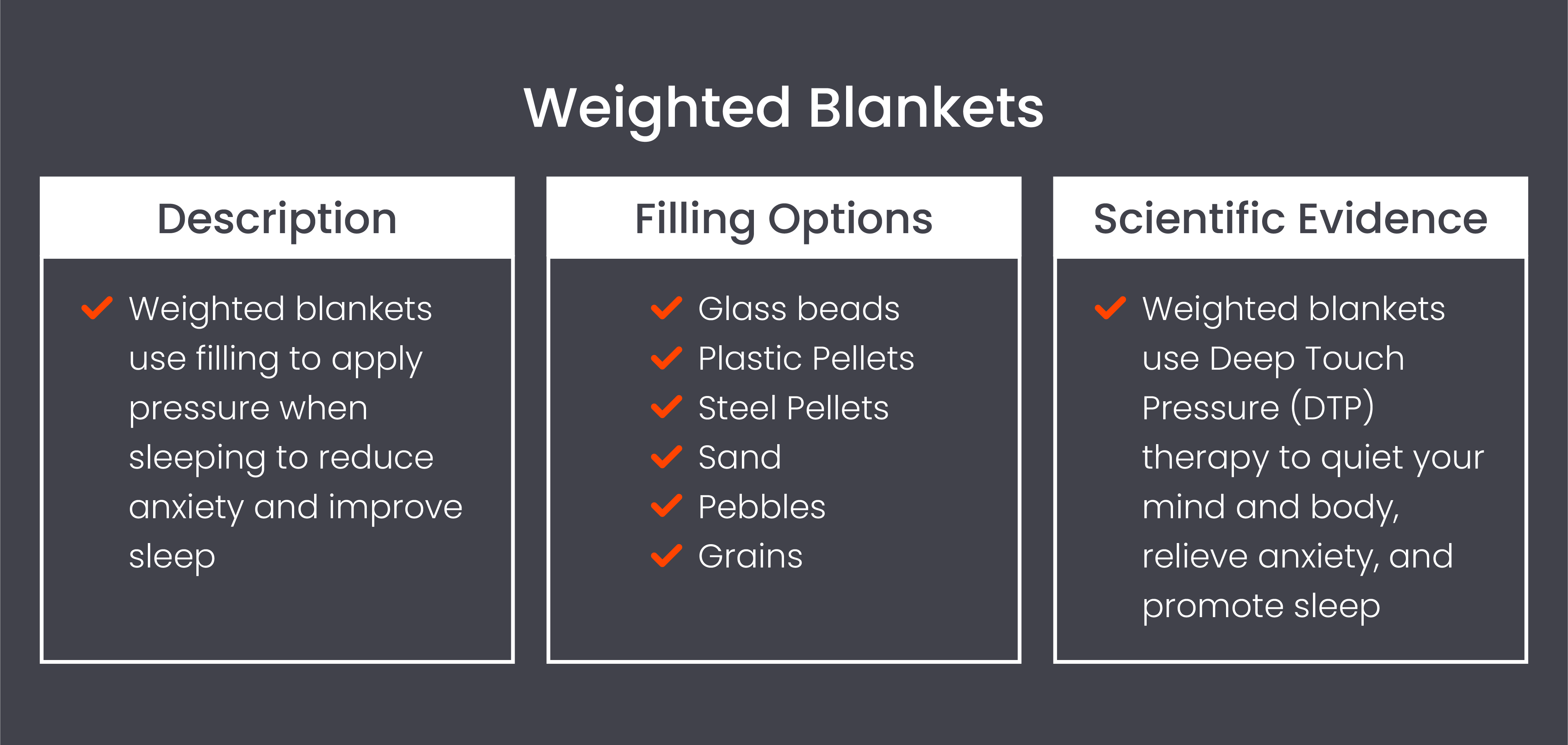
What Is a Weighted Blanket?
A weighted blanket is what it sounds like; it’s a blanket that’s heavier than your average throw blanket. Weighted blankets are typically made of quilted material and filled with glass, plastic, steel, or organic beads, which give them additional weight. Weighted blankets work by simulating deep touch pressure (DTP) therapy, which can help individuals relax. It may also be able to stimulate different mood-boosting hormones in the body.
DTP involves applying pressure to different parts of the body to stimulate the parasympathetic nervous system. Your nervous system is responsible for reacting to stressful situations by stimulating the body’s sympathetic, high-alert state associated with stress and anxiety. The parasympathetic system can help counterbalance your body’s natural reaction to stress to help you feel more relaxed.
Ultimately, weighted blankets for sleep simulate DTP to stimulate a parasympathetic response from the body to promote peace and calmness. Weighted blankets can also have psychological effects similar to the feelings you get when you’re wrapped up in a warm blanket in front of a fireplace on a cold winter night.
DTP has been proven beneficial for both children and adults with high levels of anxiety. However, you should never give an infant or a small child a weighted blanket to use on their own as it can be dangerous.
Are Weighted Blankets Safe?
Yes, weighted blankets are generally safe for most sleepers. However, there is an added risk for certain types of individuals, including young children and seniors. The weight of a weighted blanket can restrict or limit movement, making it difficult for children and seniors to remove the blanket if it covers their faces at night.
Overall, though, most healthy adults will be safe using weighted blankets whether they’re relaxing on the couch or trying to fall asleep in bed. A recent study of 30 participants between 18 and 50 years old found an improvement in anxiety relief and recorded zero safety concerns when they measured blood pressure, pulse rate, and oximetry readings while participants used weighted blankets.
While weighted blankets are considered safe, they should not be used by some sleepers, including small children and seniors who don’t have the strength to lift the blanket off of themselves to prevent suffocation or being trapped. Many weighted blankets are designed for children, but it’s important not to get one that’s so heavy the child can’t take it off themselves.
Ultimately, a weighted blanket should be about ten percent of your child’s body weight, give or take a few pounds. For example, if your child is 80 pounds, they can use a six to ten-pound weighted blanket. Therefore, while there are weighted blankets designed for children, infants and toddlers should not use weighted blankets. Additionally, your child should not use your weighted blanket as it is designed for adults and too heavy for them.
Additionally, other sleepers should check with their doctor before sleeping with a weighted blanket. Weighted blankets may not be ideal for individuals with:
- Chronic respiratory issues
- Circulatory issues
- Asthma
- Low blood pressure
- Diabetes
- Claustrophobia
- Sleep apnea
Ultimately, as long as the individual using the weighted blanket can lift the blanket off themselves to prevent suffocation or being trapped, weighted blankets are considered safe.
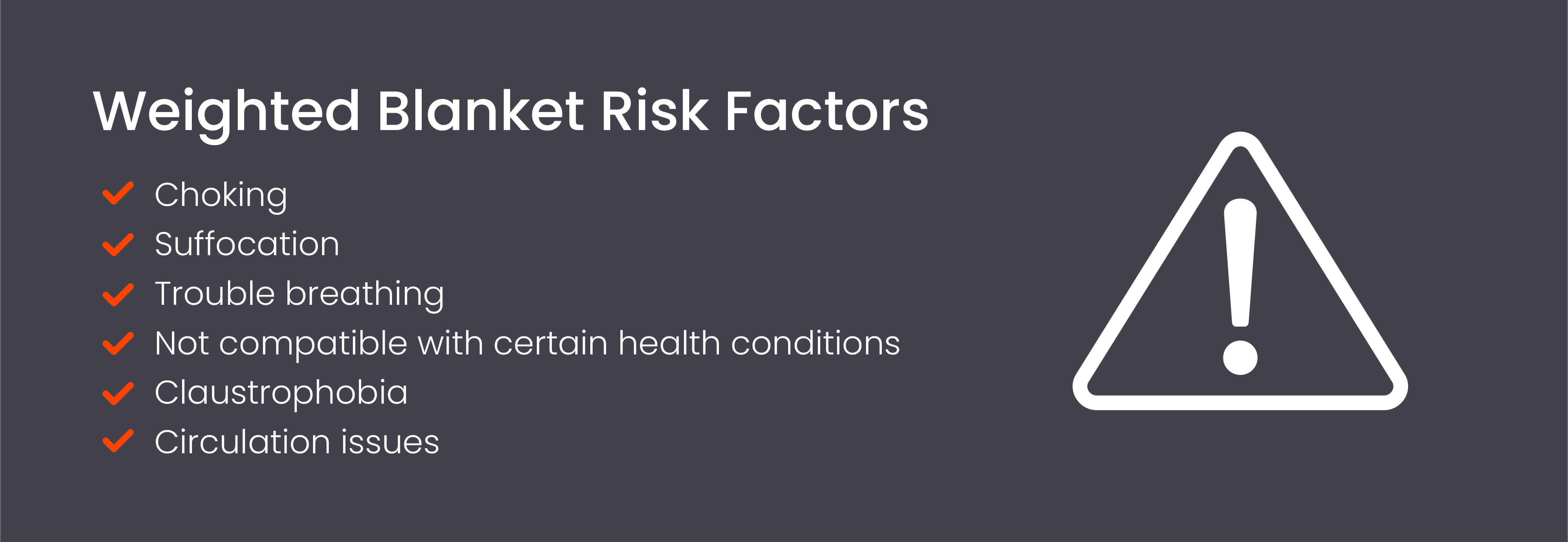
What Are Potential Risk Factors of Weighted Blankets?
While weighted blankets are considered safe, there are still risks, especially if you don’t use your blanket properly or take care of it according to the care instructions on the label. These risks include:
- Choking
- Suffocation
- Trouble breathing
- Not compatible with certain health conditions
- Claustrophobia
- Circulation issues
Using your weighted blanket properly and not letting it cover your face can help you avoid issues with suffocation or trouble breathing. Additionally, you mustn’t fold the blanket up and put all of its weight on one area of your body, as it can easily cut off circulation when the weight isn’t evenly distributed.
Weighted blankets only become a choking hazard if they’ve ripped the inside filling responsible for the weight that has come out. Because the glass, plastic, or steel beads inside are small, they can become a choking hazard to children.
Finally, some health conditions may make using a weighted blanket unsafe. For example, sleep apnea patients might not want to use a weighted blanket because it can make breathing more difficult, especially if the weight isn’t evenly distributed across the upper body.
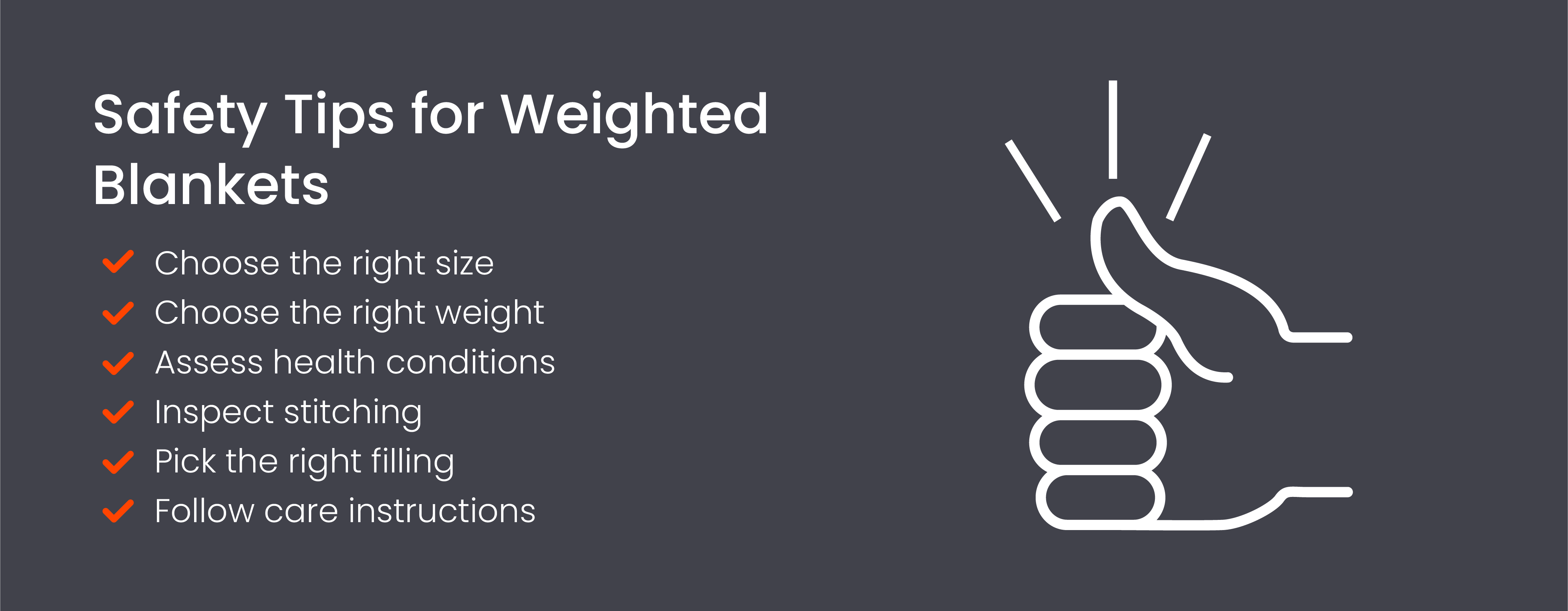
Weighted Blanket Safety Tips
While weighted blankets are considered safe, it’s important to follow a few safety tips to ensure they don’t become a risk to you or someone in your family.
Choose the right size
Weighted blankets are available in a variety of sizes, depending on your needs. For example, if you want to share a weighted blanket with your partner, you might choose to get a larger size to ensure it covers both of you. However, if you’re using a weighted blanket on your own, make sure that it’s large enough for one person to fit under comfortably. If you get a weighted blanket that’s larger than your bed, the beads might fall to one side and cause the blanket to need readjusting throughout the night.
Choose the right weight
It’s always important to choose the right weighted blanket weight based on your own weight. Your weighted blanket should be about ten percent of your body weight. For example, if you weigh 150 pounds, you should get a 15-pound weighted blanket. While you might not be able to find a blanket that’s exactly ten percent of your body weight, you can experiment with one or two pounds more or less of weight. Many people prefer heavier weighted blankets, so whatever you choose, the blanket mustn’t be too heavy to move off of your body yourself to prevent suffocation if you plan to sleep with it.
Assess health conditions: As we’ve mentioned, some health conditions, such as circulatory issues and sleep apnea, can make sleeping with a weighted blanket riskier. Consult your doctor if you’re not sure whether sleeping with a weighted blanket is safe for you.
Inspect stitching
Before you start using your weighted blanket, inspect the stitching to ensure the filling can’t come out while you sleep. If the filling does come out, the weighted blanket will become ineffective, and the filling can be dangerous to the health of your pets and children if swallowed.
Pick the right filling
The filling of the weighted blanket can affect how comfortable it is, but it can also impact the safety of the blanket. For example, glass beads are typically one of the safest fillings because they don’t collect moisture as an organic filling would. Additionally, the size of the filling might play a factor in the safety of the blanket. For example, a blanket made from microbeads might be safer than one made with larger filling material because it’s less likely to become a choking hazard.
Follow care instructions
Following the care instructions can help you keep your weighted blanket in its best condition for years. Additionally, the care instructions ensure that it won’t get ripped or torn when washing a weighted blanket. If your blanket does rip, it’s best to throw it out to prevent the filling from becoming a choking hazard to pets and small children.
Want to learn what factors to consider when shopping for a weighted blanket? Check out the weighted blanket buying guide.
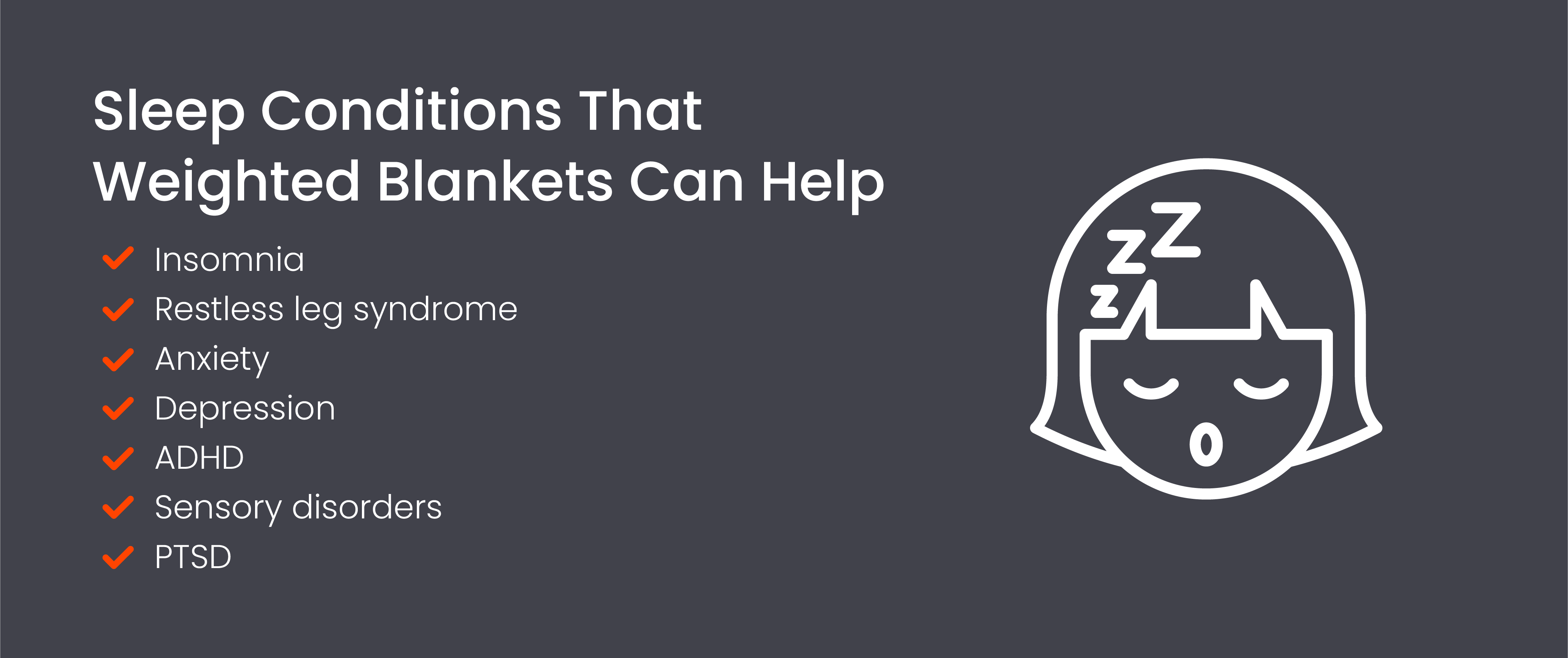
Who Uses Weighted Blankets?
Anyone can use weighted blankets, but weighted blankets can help individuals suffering from these conditions.
- Insomnia: Weighted blankets can promote better sleep by helping someone relax before bed and ensuring they stay asleep throughout the entire night.
- Restless leg syndrome: Weighted blankets can relieve restless leg syndrome by calming the nerves and relieving leg pain. It can also ease the anxiety that can cause restless leg syndrome.
- Anxiety & depression: Weighted blankets can improve sleep quality while reducing the symptoms of anxiety and depression. As you may know, getting quality sleep can help reduce the symptoms of mental illness. Additionally, weighted blankets may promote calmness by activating the parasympathetic nervous system.
- ADHD: Weighted blankets may be beneficial for those with ADHD by helping them focus while calming the mind and body.
- Sensory disorders: Weighted blankets activate the sense of touch that can help people with sensory disorders like autism focus on something instead of becoming overstimulated by their surroundings.
- PTSD: Weighted blankets for PTSD can help those suffering from PTSD in a variety of ways, including the simulation of DTP that can relieve anxiety and ground the body. Additionally, weighted blankets may decrease cortisol and increase serotonin levels to help the mind better regulate emotions.

What Are the Benefits of Weighted Blankets?
There are many weighted blanket benefits for just about any type of sleeper. Whether you sleep on your front, side, back, or curled up, a weighted blanket can help you get better quality sleep while relieving stress. Here are the top benefits of weighted blankets.
- Improve sleep quality: Weighted blankets are primarily used to help people sleep better at night. By providing your body with a warm blanket and additional weight, you can feel more relaxed, so you can fall asleep faster and stay asleep throughout the night.
- Relieve stress: Weighted blankets use DTP simulation to relieve stress by activating the parasympathetic nervous system to combat anxiety.
- Provide comfort: Weighted blankets are comfortable. Some might say weighted blankets are more comfortable than regular blankets because of their weight. Whether you’re reading a book or watching television, you can ensure you’ll be comfortable under your blanket.
- Boosts melatonin production: Because weighted blankets simulate DTP, they are thought to stimulate melatonin production, the hormone your body produces to help you sleep.
- Improves mood: Ultimately, feeling comfortable and relaxed while ensuring you get enough sleep every night can help boost your mood, so using a weighted blanket can help you feel your best every day.
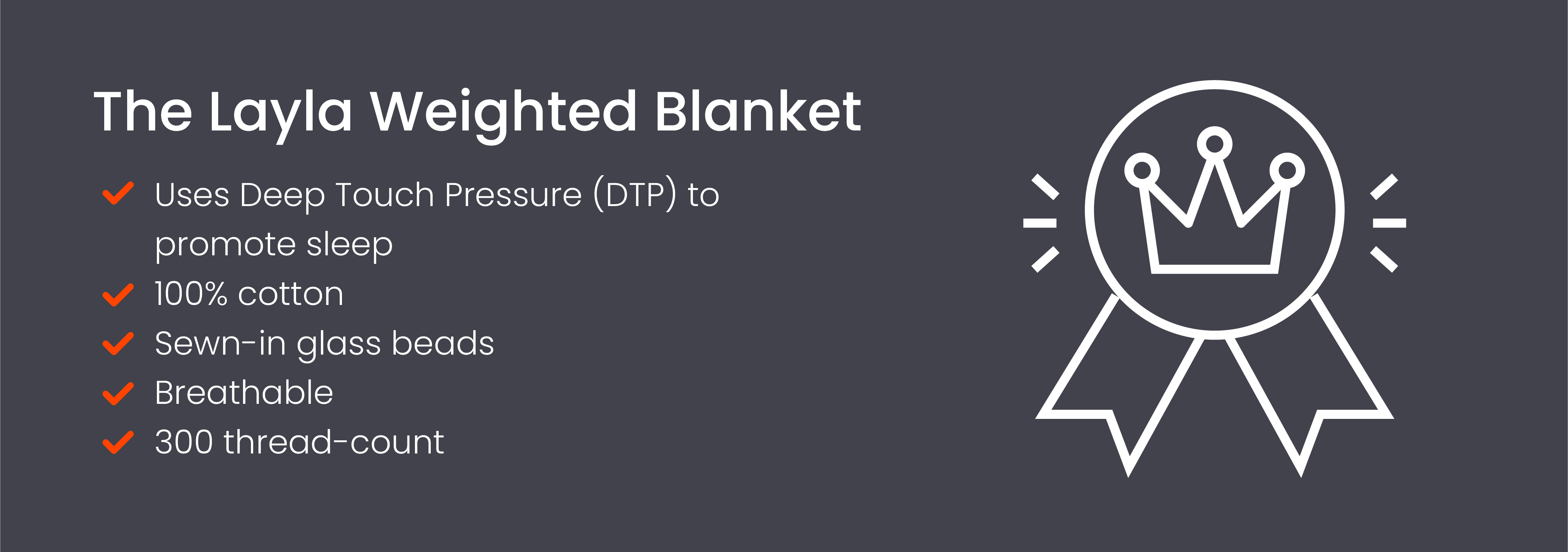
The Layla Weighted Blanket
If you’ve read all this and you’re convinced you need a weighted blanket, check out the Layla Weighted Blanket. This weighted blanket makes it feel like you’re getting a big soft hug every time you’re under it. The top of the blanket feels like Minky soft fur, while the other side is made out of 300 thread count cotton, so you won’t be left wondering, “Are weighted blankets hot,” since cotton is the most breathable fabrics. Instead, you’ll feel comfortable and calm under your Layla blanket.
Additionally, you won’t have to worry about spilling your favorite cup of tea on it when you’re relaxing on the couch because the Layla Weighted Blanket is machine washable and easy to care for. With glass microbeads, the weight of the blanket is evenly distributed across your entire body for the best sleep of your life every single night.
Weighted Blanket Safety FAQs
Are weighted blankets safe for kids?
Weighted blankets are safe for kids if you get the right weight. A weighted blanket’s weight should be roughly 10% of your child’s body weight.
Are weighted blankets safe for toddlers?
Weighted blankets are not safe for toddlers because of the risk of suffocation. Additionally, the filler inside can become a choking hazard if the blanket rips.
Are weighted blankets safe for adults?
Weighted blankets are generally safe for adults, but some adults should use caution. In addition, weighted blankets might not be safe for those with certain health conditions, so always check with a doctor if you’re concerned about using a weighted blanket.
Final Notes
Weighted blankets are considered safe for most all adults. However, some people shouldn’t use weighted blankets, including infants and toddlers, seniors, and individuals with health conditions. Using a weighted blanket properly can provide you with many health benefits, including quality sleep. Always ensure you get the right size and weight blanket to ensure your safety, and if your blanket rips, throw it out immediately so it doesn’t become a choking hazard for pets or children.







